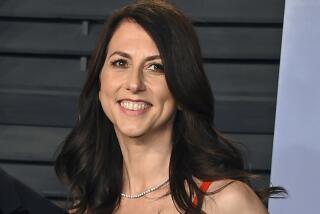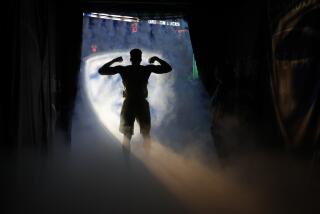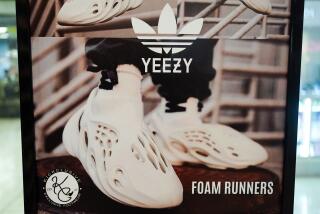Sevenly hopes to change the world one T-shirt at time
At Sevenly, a business started by young entrepreneurs in Orange County, a key to the operation is the number seven.
Each line of T-shirts and hoodies designed by the company goes on sale for exactly seven days. No more, no less.
The Fullerton company donates to seven causes: anti-slavery, hunger relief, clean water, medical help, disaster relief, anti-poverty and miscellaneous aid.
And for every item sold, Sevenly donates — you guessed it — $7.
“It’s a great number,” said co-founder Dale Partridge, who holds the title of chief world changer. “We just happened to be able to break down the world’s greatest issues into seven causes, seven days in a week, etc.
“It had tons of parallel brand play.”
Partridge, in the hallowed tradition of entrepreneurs, is always looking for an edge and an opportunity. At 26, he already has created and sold a small fitness company, and he currently co-owns a chain of rock climbing gyms in the Inland Empire.
The hook at Sevenly, which he co-founded last year with Aaron Chavez, 19, goes beyond the number gimmick. The company is following a recent trend in business models — for-profit firms that donate a major percentage of their revenue to charitable causes.
In Sevenly’s case, it’s nearly 30%. That might seem like a huge cut of revenue, but it’s also a way to generate sales.
“Consumers want to do business with brands who do good,” said Loren Solomon, founder of Advertising for Good, an agency that creates marketing campaigns for nonprofits.
Since launching in June, Sevenly has sold more than 29,000 items and donated more than $200,000 to charities including Cure Childhood Cancer in Atlanta; the International Justice Mission, which fights sex trafficking abroad; and Hope International, which provides micro-financing for developing businesses in Africa.
Toms Shoes in Santa Monica is one of the best known companies built on a social-good business model. For every pair of shoes sold, the company — founded in 2006 by Blake Mycoskie — donates a pair for a child in a Third World country.
For some customers, wearing Toms has become as much a fashion statement as a public proclamation that they’re socially responsible.
“It’s cool to be socially good today,” said Aradhna Krishna, a University of Michigan professor who studies cause marketing.
A consumer study last year by the Cone Communications public relations agency found that 80% of those surveyed said they would be likely to switch to a brand associated with a good cause if product price and quality were comparable.
In the 18-to-24 age group — commonly called millennials — 53% had purchased a product or service tied to a cause in the last year.
Sevenly, which has a staff of 12 including the founders, has had $700,000 in sales since its inception, Partridge said. Even with giving away nearly 30% to causes, he said the company makes a small profit.
“We’re not swimming in the green, but we’re doing well,” Partridge said.
The idea for the business was born in Partridge’s living room in Corona in April when he and Chavez, who had dropped out of junior college to become a social media consultant, began brainstorming about how to blend charity, social media and e-commerce.
“What’s the point of having a business that’s not doing anything for the community?” Partridge asked.
The two friends wanted to create a business that could raise money and awareness for a variety of charities that had on-the-ground resources to put donations to use in a meaningful way.
Once a charity is identified, Sevenly’s designers create typography and images to go onto stock T-shirts and hoodies. For example, clothing designed for a recent sale that gave funds to Girls Educational & Mentoring Services, or GEMS — a nonprofit that aids young women who have been sexually exploited — said “Girls Are Not For Sale.”
“Like any nonprofit, we are always looking for new ways to get our message out there and fund-raise,” said Bianca Baquerizo of GEMS. “Sevenly did that on both fronts.”
Items designed for a Sevenly campaign are sold for seven days exclusively on its website. T-shirts go for $22 and hoodies are $35.
The sale is promoted via Sevenly’s social media outlets, but the company also asks the causes to promote the campaigns through their own Facebook pages and tweets.
For its week in the Sevenly spotlight, GEMS, based in Harlem, N.Y., got $16,000. Not a huge amount, but the nonprofit also benefited from being featured on the Sevenly site.
“Because they have a lot of followers, they brought a lot of attention to our cause,” Baquerizo said. “There are more people now who know about GEMS.”
And, of course, it works both ways — people who visited the GEMS site that week were exposed to Sevenly’s business.
Chavez said 85% of the company’s sales are driven by social media.
“I think it’s really exciting,” said Solomon of Advertising for Good. “They’ve tapped into the zeitgeist of social media.”
Partridge said Sevenly expects to hit $1.4 million in sales in its first year of operation. Eventually he and Chavez hope to grow the company to the point where it has about 30 employees and yearly revenue of $30 million.
But maybe not more than that. Getting too big would mean a loss of hands-on control, whether in designing the products or working with nonprofits.
“We’d like to stay small and efficient,” Partridge said. “That way we can make the most impact.”







